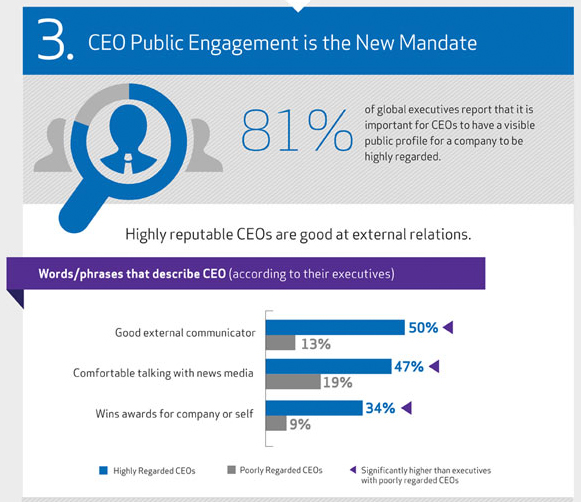"Humility is now the new green among CEOs," is one of the key takeaways from Weber Shandwick's "CEO Reputation Premium: Gaining Advantage in the Engagement Era" survey released March 6.
The major finding: 81 percent of executives polled believe CEO engagement and visibility is particularly crucial to a company's reputation.
Back to humility, the Interpublic unit says CEO reputation isn't about stroking egos or celebrity. Rather, "it would be hard to count on one hand the names of today's celebrity CEOs."

WS speculates that the rise of humility among CEOs is "possibly because they've all experienced 15 minutes of shame in addition to 15 minutes of fame in this tell-all world."
The research finds while 22 percent of respondents consider their CEO humble, highly-regarded corporate chieftains are nearly six times as likely as poorly regarded CEOs to be considered humble by their executives by a 34 percent to six percent margin, respectively.
WS finds humble CEOs are considered good communicators, open/accessible and comfortable talking to reporters. They are twice as likely to participate in social media than their less humble counterparts.
The firm concludes that humility is "a desirable quality that is associated with a positive reputation and effective communications style. It is also a trait that the global media has tuned into, so consider it a part of the CEO reputation premium."
WS research shows that social media is not yet a big reputation driver. Executives rated social last (32 percent) among factors that influence corporate reputation.
Quality of products & services topped the list at 66 percent. It was followed by financial performance (57 percent), type of industry (50 percent), CEO reputation (49 percent) and marketing/communications efforts (49 percent).
Chris Perry, digital president of WS, believes social lags because it's viewed around the world as a fairly new reputation builder.
Perry, however, says social is "fast becoming a reputational asset."


 Publicis Groupe CEO Arthur Sadoun puts competition on notice... Macy's throws in the towel as it appoints two directors nominated by its unwanted suitor... The Profile in Wimpery Award goes to the Ford Presidential Foundation for stiffing American hero and former Wyoming Congresswoman Liz Cheney.
Publicis Groupe CEO Arthur Sadoun puts competition on notice... Macy's throws in the towel as it appoints two directors nominated by its unwanted suitor... The Profile in Wimpery Award goes to the Ford Presidential Foundation for stiffing American hero and former Wyoming Congresswoman Liz Cheney. JPMorgan Chase chief Jamie Dimon's "letter to shareholders" is a must-read for PR people and others interested in fixing America and living up to its potential... Get ready for the PPE shortage when the next pandemic hits... Nixing Netanyahu. Gaza carnage turns US opinion against Israel's prime minister.
JPMorgan Chase chief Jamie Dimon's "letter to shareholders" is a must-read for PR people and others interested in fixing America and living up to its potential... Get ready for the PPE shortage when the next pandemic hits... Nixing Netanyahu. Gaza carnage turns US opinion against Israel's prime minister. Trump Media & Technology Group sees Elon Musk's X as an option for those who want the free expression promised by Truth Social but without Donald Trump, owner of 57.3 percent of TMTG... Chalk one up for "anti-woke warrior" governor Greg Abbott as University of Texas lays off 60 DEI-related staffers... Five percent of Americans see the US as its own worst enemy, according to Gallup.
Trump Media & Technology Group sees Elon Musk's X as an option for those who want the free expression promised by Truth Social but without Donald Trump, owner of 57.3 percent of TMTG... Chalk one up for "anti-woke warrior" governor Greg Abbott as University of Texas lays off 60 DEI-related staffers... Five percent of Americans see the US as its own worst enemy, according to Gallup. Nine of the Top 100 firms that participated in O'Dwyer's rankings last year apparently threw in the towel for the 2024 scorecard. Seven other firms also went AWOL.
Nine of the Top 100 firms that participated in O'Dwyer's rankings last year apparently threw in the towel for the 2024 scorecard. Seven other firms also went AWOL. The silence of the White House enables Israel's crackdown on foreign media as it objects to coverage of the carnage in Gaza... Israel plans yet another probe. Promises investigation of its "unintentional" attack on workers delivering food to famine-sticken Gaza... Trump White House media star Hope Hicks to return to spotlight.
The silence of the White House enables Israel's crackdown on foreign media as it objects to coverage of the carnage in Gaza... Israel plans yet another probe. Promises investigation of its "unintentional" attack on workers delivering food to famine-sticken Gaza... Trump White House media star Hope Hicks to return to spotlight.


 Have a comment? Send it to
Have a comment? Send it to 
No comments have been submitted for this story yet.